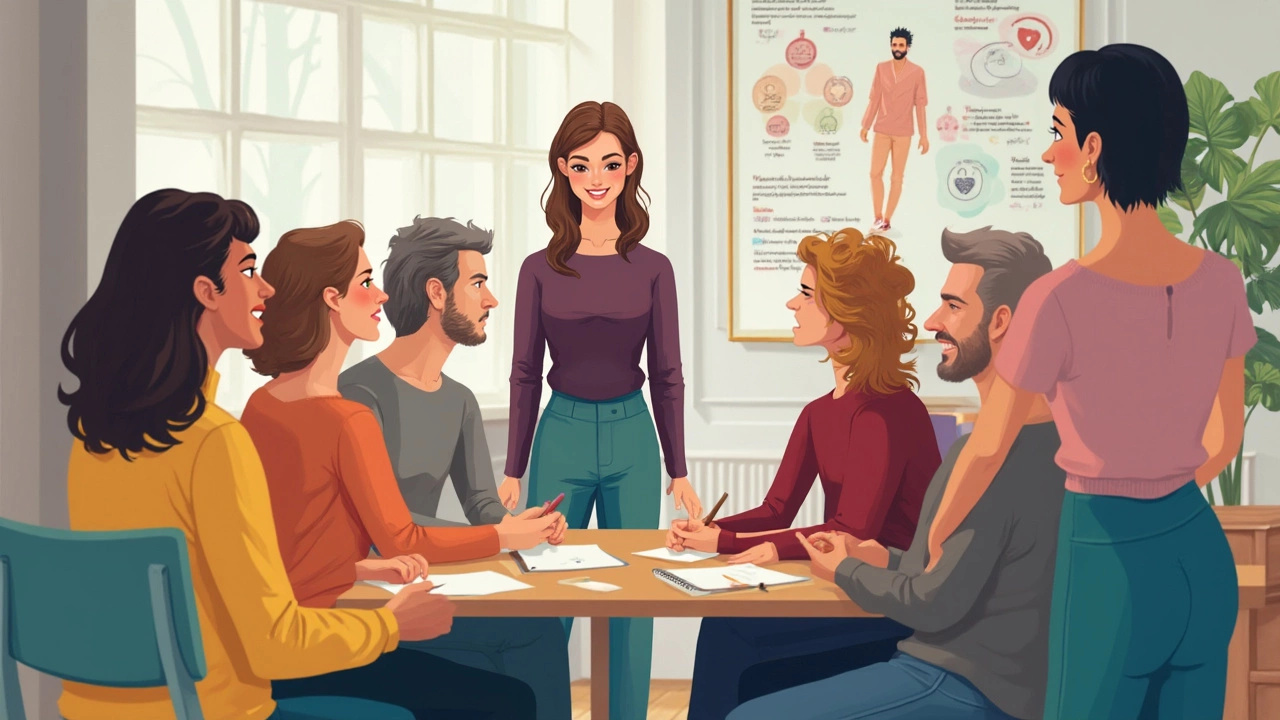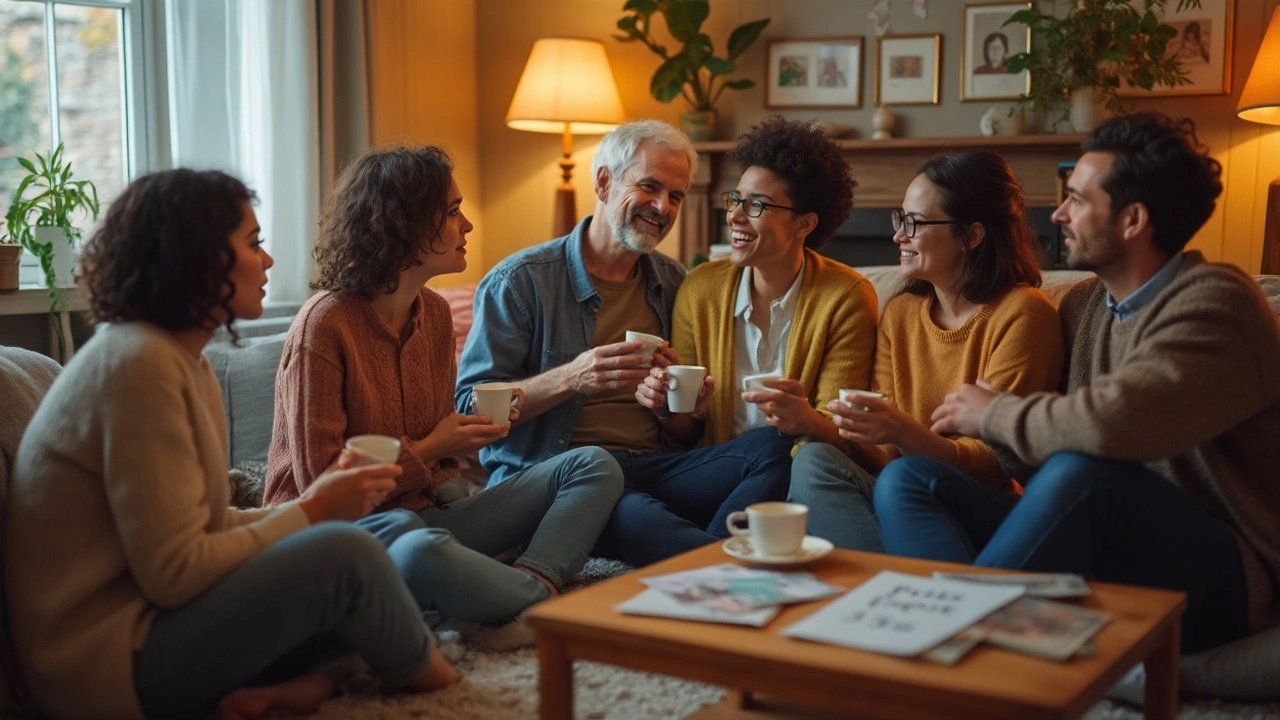Most people stop their sex education as soon as they pass an awkward class in high school, or after some frantic late-night Googling in their twenties. But sexual knowledge doesn’t just freeze in time with your biology class diagrams. Whether you’re thirty or seventy, your body, your desires, and what you actually want from sex are always evolving. Yet so many adults think they’re supposed to know it all by now—like sex is a choreographed dance and you’ve got two left feet. Truth is, staying curious about sex actually keeps life interesting, relationships stronger, and yes, the bedroom way less boring.
Why Adult Sex Education Is More Important Than You Think
Think about it—would you stop learning about money, parenting, or your own health once you hit twenty-one? Of course not. Sex is no different. Your body can change after kids, decades of stress, or just age. So, it makes zero sense to rely only on what you learned as a teenager to guide you for the next fifty years. And that’s more common than you think. A 2023 survey by the Kinsey Institute found that only 17% of adults in their forties felt their earlier sex education still helped them. Everyone else? Struggling to adapt to things like low desire, different turn-ons, or new boundaries.
There’s also huge stuff we were never taught in school—at least, not properly. Pleasure, consent, kink, emotional safety, and how sex connects to your mental health. If someone brings up BDSM or sex toys in the break room, you get awkward giggles and someone pretending they didn’t hear. That’s a shame, because adult sex education is about more than just mechanics. It helps you talk honestly, explore new things, and understand that your needs and your partner’s are allowed to change.
Adults face specific challenges schools never covered. Think chronic illness, disability, the impact of medication on libido, raising kids with healthy attitudes, or dating again after divorce. Did anyone teach you how to talk about past trauma in the context of sex, or how to handle mismatched desires without shame? Probably not. That gap has big consequences—we see it in the numbers. For example, the British Association for Sexual Health & HIV says that 53% of older adults report difficulty discussing sex with healthcare professionals. That’s most likely because of embarrassment or believing "it’s too late for me." But ongoing learning changes that vibe entirely.
Even the legal and cultural landscapes around sex shift fast—think about the recent explosion of online dating, changing consent laws, or what’s on offer with sex workers and London escorts. Knowing your rights and what’s safe isn’t something you just automatically figure out. Misinformation and myths still spread like wildfire on Instagram and TikTok. Adult sex ed keeps you in the know, making you less likely to accept dangerous or unsatisfying behavior.
Relationships get better too when you’re both learning and talking. If you’re single, you learn what you actually want, not just what to avoid. If you’re with someone, instead of sliding into routine (or silent frustration), you can explore together. In fact, therapists say couples who keep learning about sex report higher satisfaction, more intimacy, and fewer misunderstandings. It’s not about chasing the world’s craziest sex life. It’s about understanding—what matters for you now that didn’t matter before? What do you want to try? What boundaries do you want to set or challenge?
Sexual education doesn’t end with puberty. If anything, that’s when things start to get complicated—and needing better information is normal, not weird. Whether you want emotional connection, practical tips, or even just a safe place to ask questions, adult sex ed holds the answers no awkward high school class ever tackled.

What You Didn’t Learn in School (But Definitely Should Know Now)
Alright, let’s get real—school mostly focused on pregnancy, STIs, and a very basic sense of anatomy. It never touched on pleasure beyond “don’t do it” or “wait for marriage.” There’s so, so much more you should know once you’re actually doing the thing—whether you’ve been having sex for years or are diving back into dating after a break. Some of the most useful ground you cover as an adult comes from honest, unbiased information, not just what you hear at the gym or from old sitcom reruns.
First up: pleasure is central. More adults are finally realizing that sex isn’t just about performance goals. It’s about your senses, your brain, and what makes both people actually enjoy the experience. For example, only about 25% of women report orgasm from intercourse alone, while most men have a much higher rate. If nobody talks about clitoral stimulation, or everyone feels too embarrassed to say what they like, frustration’s the end result. Instead, tips like swapping routines, using lube, or exploring beyond P-in-V sex actually build confidence for both of you.
Consent is another huge one. We’re finally talking about what real, enthusiastic agreement looks like. Maybe you were taught “no means no,” but nobody explained that consent is ongoing and can change with the mood, the relationship, or how your day went. It doesn’t kill the mood—being clear actually lets you both relax. Adult sex ed focuses on communication in a way school never did. The best advice? Make “Can I try this?” or “How does this feel?” a normal part of sex talk, not a weird, out-of-nowhere question.
There’s also the reality of sexual health outside basic STIs. Have you checked in with your doctor about pain, dryness, or performance changes? Most adults worry those things mean something’s wrong with them, when the real answer is almost always physical or emotional stress. Talk therapy, pelvic floor exercises, or open chat with a medical expert are all ways to handle changes that are completely normal as you age. Treating sex as a lifelong topic lets you spot red flags—and avoid shame spirals fueled by misinformation.
Mental health and sex are deeply linked too. Sex can be a stress-reliever, or—if things go wrong—a source of stress and anxiety. Learning how past trauma, body confidence, or anxiety impact desire lets you tackle real issues instead of just hoping they solve themselves. Did you ever learn how to talk about triggers with a partner, or say "no" (or "yes!") without guilt? If not, you’re definitely not alone. About 60% of adults who experienced sexual trauma don’t bring it up when entering new relationships, which creates silence and disconnect. But learning to have these conversations changes everything: guilt drops, intimacy grows.
What about those “taboo” interests—kink, BDSM, or open relationships? For some, it’s about expressing themselves; for others, it’s about reigniting a spark or simply finding what feels good. Sex educators say learning about these areas can dismantle shame and help couples or singles feel way more comfortable with what excites them. No, you don’t have to be into any of it. The point is to know that healthy adult sex can look a thousand different ways, and there’s value in being well-informed—so you’re never stuck with old stereotypes or misinformation. If you’re ever curious about exploring safely, professionals like sex workers can be great sources of practical, real-life advice compared to whatever you find on random forums.
Modern adult education also digs into how to support your loved ones. Maybe you have teens starting to ask questions, or aging parents navigating sex in later years. Schools rarely give you the tools for those chats. Understanding everything from hormonal changes to what keeps desire alive after decades together lets you support others—and grow alongside them.
Let’s not forget about technology: sexting, dating apps, virtual intimacy, and porn literacy. Plenty of adults end up on the wrong end of technology simply because they feel it’s “not for them” or “too risky.” But just like any other life skill, learning smart and safe ways to use tech in your intimacy keeps you from getting burned—emotionally or otherwise.

Sexual Growth Never Stops: How to Keep Learning and Evolving
Ready to keep growing? The best part is, it’s totally possible to keep leveling up your sexual knowledge well into your sixties, seventies, and beyond. There’s no age limit on learning how to communicate, experiment, or just enjoy yourself more. But where do you start—and how do you actually do it without feeling weird?
A good first step is letting go of shame. Seriously, everyone has questions or things they wish they knew earlier. Even those who seem confident have gaps. Find reliable resources—think podcasts run by real sex therapists, classes at community centers, or books by respected educators. Don’t just settle for top Google results; look for perspectives that celebrate diversity and encourage curiosity, not just “how to get more sex.”
Here’s a pro tip: make learning a regular thing, not just an emergency fix when something feels off. Set aside one evening a month to watch an educational video, listen to a podcast, or read an article together if you’re with a partner. If you’re single, use private journals or online forums to explore what you’re curious about—everything's fair game, from pleasure anatomy to safe kink practices. The world is full of trusted resources, but also plenty of junk, so aim for the sources that empower you, not shame you.
And yeah, talk to real people. Sex therapists help tons of adults—absolutely regular people—every single week. Impossible? Not at all: according to the American Association of Sexuality Educators, Counselors and Therapists (AASECT), demand for adult-focused sex education jumped 48% between 2022 and 2024. If therapy isn’t your thing, groups focused on open discussion can help, whether online or in-person. Ask questions, compare experiences, and realize you’re in very good company.
Practical experimentation is just as valid as reading books. Ditch perfectionism. Try new touches, fantasies, or even revisit the basics with a different mindset. Remember, what felt good at twenty might not at fifty—and vice versa. Communication afterward helps a ton: “How did that feel? Want to explore this again?” makes sex feel more like a growing adventure, instead of a performance review.
If you’re in a relationship, check in regularly about both of your needs. Little changes—switching up locations, schedules, or simply putting phones away—refresh routine. And yes, it’s totally normal for desire to ebb and flow. Life is stressful, bodies change, and sometimes you’re just tired. Ongoing learning reassures you that you’re not broken or weird, you’re just human.
Keep an eye open for workshops or events in your city, too. There are flexible opportunities everywhere these days—even some sex toy shops offer friendly Q&As and safe spaces for education. And if you’ve ever been curious about what professionals in the field can share, even just chatting with a trusted source or exploring with London escorts can offer rare insight that you’re not going to find on lifestyle blogs.
At the end of the day, the one thing nobody needs is more secrecy or embarrassment. The more you learn, the better you get at advocating for yourself, understanding your partners, and finding what actually makes you happy. Honestly, isn’t that what it’s really about?
Here’s a quick look at just a few sources of adult sex education and their usage in the past year:
| Resource | Estimated Users (2024-2025) | Main Topics |
|---|---|---|
| Podcasts by sex educators | 2 million+ | Pleasure, consent, relationships, kink |
| Online courses/webinars | 800,000+ | Body changes, communication, sexual health |
| Therapy and counseling | 1.1 million+ | Intimacy issues, trauma, relationships |
| Workshops (in-person) | 500,000+ | Sensuality, play, creative connection |
So don’t let sex get stale, hidden, or filled with guesswork. Every single stage of life offers up new questions worth exploring—so keep learning, keep asking, and enjoy the process. You’ll wind up with better confidence, more fun, and stronger connections, no matter where you are or who you’re with.
